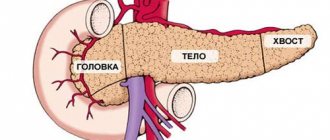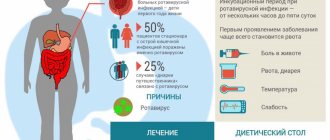An intestinal infection implies a very serious disease. It can overtake any person. This disease consists of many different processes that ultimately disrupt the functioning of the gastrointestinal tract.
It develops as a result of harmful toxins and bacteria entering the human body. Depending on how the disease manifests itself, you can find out what stage it is at.
Sources of intestinal infections
Sources of various pathogens of intestinal infections can be:
- sick people - they secrete viruses or bacteria for varying periods of time, from several days to weeks;
- asymptomatic carriers - people who themselves do not have any symptoms, but pathogens are present in their body);
- food if it is contaminated with certain microorganisms due to violation of sanitary rules during cutting, preparation, storage;
- water, if non-centralized sources are used, when swimming in dangerous bodies of water;
- Animals – Some infections can be transmitted from pets or livestock.
Infectious diseases can be in the form of isolated cases, outbreaks and epidemics. In the warm season, bacterial infections and foodborne illnesses occur more often; in the cold season, outbreaks of viral diseases are possible.
Intestinal flu (rotovirus infection)
Intestinal flu is a disease that disrupts the gastrointestinal tract.
Intestinal infections of this type appear as a result of the presence of rotavirus in the body. It is transmitted through food, water, and touch.
Rotavirus infection develops after the virus enters and consolidates in the cells. The symptoms of this disease begin to make themselves felt even before the bacteria actively multiply. Typically this period lasts about five days.
Ways of contracting intestinal infections
You can become infected with intestinal infections in three ways.
Food - through products and dishes that are contaminated with pathogens or prepared in violation of the rules of cutting, storage, and heat treatment of products. Dairy products, salads, meat products, eggs, and fresh fruits are especially dangerous.
Waterborne – infection occurs due to the pathogen entering with water from unverified, questionable sources. Typically, this situation occurs when there is a water supply accident or when water is used for drinking from wells, rivers, or lakes.
Contact-household – spread of infection from carriers or patients through shared objects, dishes, and dirty hands.
To the point
Worms: what symptoms indicate infection with these parasites
Causative agents of intestinal infections
The signs of intestinal infections are quite similar and typical, although each pathogen has its own distinctive features. There are several groups of pathogens.
Bacteria (among the most common are Yersinia, Salmonella, Proteus, E. coli, Staphylococcus) that produce toxins. High concentrations of toxins form the clinical picture of pathology – foodborne toxic infections.
Viruses – damage to the digestive tract is most often provoked by rotavirus, noravirus, adenovirus and some other pathogens. Often, along with intestinal symptoms, they form signs of respiratory damage.
Protozoal infections are caused by protozoan parasites. These are amoebas or lamblia. They may produce symptoms of bloody diarrhea with severe abdominal pain.
Diagnosis and treatment
As a rule, symptoms of intestinal infections appear unexpectedly. At the first stage of the disease, a person experiences a headache, decreased appetite, increased body temperature, looks lethargic, and feels weak. At this stage, an intestinal infection can be mistaken for ARVI. But soon patients experience nausea and vomiting, cramping abdominal pain, flatulence, and mucus, pus or blood may appear in liquid feces (with dysentery). In some cases, an intestinal infection may be asymptomatic, but the infected person is still a source of infection.
If there are any signs of disruption of the digestive system, it is very important to identify the disease in a timely manner. Some symptoms of intestinal infection may resemble poisoning, including from medications, acute appendicitis, pneumonia, ectopic pregnancy or myocardial infarction.
To accurately determine the diagnosis, you need to consult an infectious disease specialist. To make a diagnosis, the patient will have to submit stool or vomit for bacteriological examination. Treatment of any intestinal infection is complex therapy. It consists of removing the pathogen and microbial poisons from the body, restoring the water balance and microflora of the gastrointestinal tract, as well as following a special diet. During the recovery period after any intestinal infection, it is advisable to avoid foods that cause fermentation in the gastrointestinal tract and flatulence, such as black bread, milk, legumes, cabbage, and beets. During this period, it is better to include liquid rice porridge with water, baked apples, and fermented milk products in the menu.
As for the rules for preventing intestinal infections, they are quite simple. To protect yourself from diseases of this group, you must:
- stop drinking unboiled milk;
- Always boil water from questionable sources before drinking;
- Before cooking, wash vegetables and fruits thoroughly under running water, or preferably with soap;
- Wash your hands before every meal;
- adhere to the rules and shelf life of food products.
To protect a child from intestinal infections, it is necessary to teach him not to bite his nails and not to put dirty hands and toys in his mouth.
Rotavirus infection
The causative agent of intestinal infection can be different organisms. One of the most common pathogens is rotavirus. People also call it “intestinal” or “stomach flu”. With all the ensuing symptoms: vomiting or diarrhea. Most often it affects children, but adults can also catch the “stomach flu”.
The incubation period for the development of intestinal infection in adults ranges from several hours to several days. The illness can last up to two weeks. In adults, as a rule, the symptoms are not so pronounced; the disease can occur without fever, but they are very unpleasant.
Norovirus infection
Norfolk virus spreads more often in winter, causing outbreaks of noravirus infection. Its incubation period lasts from several hours to two days, and occurs mainly in adults.
It manifests itself as high fever, aching muscles and joints, severe malaise, decreased appetite, rare vomiting and frequent diarrhea. Aching pain in the pit of the stomach and navel is also typical. Frequent diarrhea can lead to dehydration, which causes dry skin and mucous membranes, decreased urine volume, headache and severe weakness.
Good to know
First aid kit for the country: a list of medications for children and adults
Symptoms of intestinal infection in an adult
Usually the first symptoms appear quite quickly: 6 to 48 hours pass after the pathogen enters the body, and you feel unwell. It's time to remember what you ate in the last hours, who you contacted, and whether you visited the sick. It is necessary to exclude poisoning: mushrooms, medicines, spoiled foods. Have you ever used anything like that? Did you really wash your hands before eating? And if the symptoms (see below) have been observed in recent days among your friends, relatives or colleagues, then most likely you have caught an intestinal infection. An intestinal infection can also begin like a cold: with a sore throat, low temperature, up to 37.5 °C. But soon the disease seems to “move” into the digestive organs. An intestinal infection in an adult usually manifests itself:
- fever;
- vomiting, diarrhea;
- pain in the lower abdomen;
- discomfort, sometimes a sharp increase in body temperature (up to 38–39 ° C);
- weakness, pallor, shortness of breath, there may be cardiac dysfunction;
- the most dangerous thing in this case is the loss of fluid from vomiting and diarrhea.
First aid for intestinal infection
First of all, during intestinal infections it is important to maintain fluid balance to avoid dehydration and loss of electrolytes. This is achieved by drinking liquids in fractions - sweet tea with lemon, still mineral water, electrolyte solutions, 1 - 2 sips every 5 - 10 minutes.
Important! If the condition worsens, the temperature does not go down, vomiting and diarrhea do not go away, a large amount of fluid is lost, an ambulance must be called and hospitalization.
How to cope with illness in children
When fighting an infection, you need to drink a lot of special solutions.
The development of the disease in children will be accompanied by symptoms such as vomiting, severe diarrhea, and weakness. In this situation, it is necessary to urgently contact a doctor so that he can prescribe treatment.
Very often, most parents try to immediately remove the symptoms of the disease, but the bacteria are not removed from the body. This should not be done at first, after the onset of vomiting and diarrhea.
It is these symptoms that indicate that the body is fighting the virus and is trying to defeat it on its own and cleanse itself of harmful toxins. When these symptoms are removed in the first stages, the body will begin to become even more poisoned.
When parents are absolutely sure that these symptoms appeared as a result of food intake, and they know what product triggered it, it is necessary to induce vomiting to cleanse the stomach. It is also necessary to give the child plenty to drink so that the body restores water balance.
Parents should monitor drinking. In order for mineral salts to be restored in the required quantity, you need to purchase special solutions at the pharmacy. You should not drink juices, milk or kefir during this period.
Treatment of intestinal infection in adults
If symptoms of an intestinal infection appear, you should consult a doctor. After all, there are diseases with similar symptoms. It is important to understand what exactly is happening to you.
Diagnostics
Based on the examination, indications of contact with infectious patients and typical complaints, one can only suspect an infection. But laboratory data helps to accurately determine the pathogen. It is important to collect materials before starting treatment, immediately upon admission, and conduct blood tests to determine the severity of the infection.
If the infection is severe, urine and blood cultures may be done to rule out spread of the pathogen to other tissues.
If necessary, an ultrasound of the internal organs is performed, the patient is consulted with a surgeon, and an X-ray of the abdominal cavity is performed to exclude surgical pathologies.
Modern methods of treatment
What to do if there is such a sick person in the family?
Send the sick person to lie down. Preferably in a separate room where children should not be allowed. If you feel sick, bring a basin.
Is the person shivering? Cover him with a blanket. Preferably one that is easy to wash later.
Provide a separate container for drinking for the sick person.
In general, methods of treating intestinal infections largely depend on the patient’s condition. If the symptoms are not so pronounced, the patient has a strong immune system, and there are no chronic diseases, then you can try to cure yourself.
How to treat and not pass on an intestinal infection to others?
Treatment depends on the pathogen and severity of the disease. For example, dysentery or norovirus can be treated at home. But only a specialist can help with salmonellosis. In any case, to make a decision on treatment, you must call a doctor and undergo laboratory tests.
Here's what you can do to get started:
- Restore water-salt balance. It is better to drink boiled or bottled water with the addition of special solutions for rehydration
- Take enterosorbents to relieve intoxication of the body, as well as painkillers and antipyretics
- Eliminate fried, salty, spicy, raw foods from your diet
- If you want to eat, it is better to give preference to simple food: soup, rice, bread
- Rest more
How to avoid infecting others if you or your loved ones are sick?
- Wash your hands thoroughly
- Regularly disinfect common areas and the patient's room: especially the toilet, bathroom, kitchen
- Provide separate dishes and towels for the sick person
- Change bedding and clothing regularly and wash them at high temperature (60°C)
- Limit your social circle, isolate the sick person
It is recommended to visit public places no earlier than two days after the symptoms have completely disappeared, and places such as a swimming pool are better after two weeks.
Prevention of intestinal infection in adults at home
The main thing is personal hygiene. “As a rule, intestinal infections enter the human body through dirty hands. In Russia, for example, 75% of men and 56% of women do not wash their hands after visiting the toilet! They manage not to wash vegetables, berries and fruits at all.”
What other measures to prevent intestinal infection in adults are recommended by sanitary doctors:
For raw meat and fish, the kitchen should have separate knives and separate cutting boards. You cannot cut raw meat (fish) and vegetables with the same tools.
Hot dishes should be cooked at temperatures above 70 °C. This temperature is lethal for germs.
Do not leave cooked food at room temperature for more than two hours.
Do not defrost food at room temperature. Better in the refrigerator.
What are intestinal infections and where do they live?
Intestinal infections are infections of the body by bacteria, viruses or parasites through the gastrointestinal tract. Normally, many different types of bacteria live in our intestines. But if food, antibiotics or infection cause dysbiosis, unpleasant symptoms begin.
Symptom or cause? What is dysbiosis and what to do about it?
Most pathogenic bacteria enter the body with water or food. For example, you swam in dirty water and accidentally swallowed some, ate undercooked meat, a raw egg or expired kefir.
Intestinal infections are also called “dirty hand disease” because you can become infected through contact. An underestimated source of infection is patients without clinical manifestations of the disease.
A person remains infectious throughout the entire disease cycle: from the incubation period to complete recovery. And it can take up to several weeks. The infection enters the environment through feces and vomit, and viruses are transmitted by airborne droplets.
In the summer, the risk of infection is higher.
People interact with each other more often and more closely, the shelf life of products is shortened, and in warm conditions bacteria multiply faster. It is important to pay attention to children, who often accidentally swallow contaminated seawater and taste everything they see.
Bacterial pathogens of intestinal infections: Shigella, Salmonella, Vibrio cholerae, Staphylococcus, Escherichia, Brucella, Clostridia. Viral pathogens of intestinal infections: rotavirus, enterovirus, adenovirus. Bacterial intestinal infections associated with infection with staphylococcus and salmonellosis are more often diagnosed.








